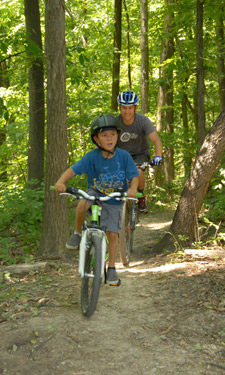 Cleveland Metroparks is a 22,000-acre park district in northeast Ohio hosting nearly 15 million visits in the region through a mission of “Conservation, Education, and Recreation.” There are just over 300 miles of trails through woods and meadows, including paved all-purpose trails along with natural surface hiking and equestrian trails.
Cleveland Metroparks is a 22,000-acre park district in northeast Ohio hosting nearly 15 million visits in the region through a mission of “Conservation, Education, and Recreation.” There are just over 300 miles of trails through woods and meadows, including paved all-purpose trails along with natural surface hiking and equestrian trails.
The park district has been undergoing a strategic planning process. Consultant findings and public input called for more active, outdoor recreation opportunities, in particular mountain biking. Mountain bikers were a large, underserved user group with only two miles of legal trail in the county, and they lobbied for several years for more access. Historically, the park district’s experience with the local mountain bike club, Cleveland Area Mountain Biking Association (CAMBA), had little positive discussion or progress on the issue of increasing opportunities.
Executive Director Brian Zimmerman faced internal and external resistance to mountain biking when he arrived in 2009. He strategically approached the trail-building process, changing the culture internally, providing a great asset to the community, and building a relationship with a very devoted volunteer corps. He aimed to prove that active recreation was not incompatible with the agency’s conservation goals.
Cleveland Metroparks identified an 800-acre parcel of existing wooded area for mountain biking, called Royalview. Fears the bikes would destroy the natural area and disturb other users brought concerned members of the public to board meetings questioning the decision. Cleveland Metroparks staff maintained the position that a properly built single-track trail could protect habitat while fulfilling the mission to provide healthy outdoor activities for the public.
The Natural Resource Division played a key role in answering concerned constituents. Existing trails in the Royalview area were deteriorated, as they were improperly built on fall lines and in low areas, holding water, exposing roots, and causing widening. Park district natural resource staff recognized that a low-impact, sustainable, single-track trail could help repair the impact. Before breaking ground, they performed an exhaustive inventory and analysis of plants, animals, and soils to determine sensitive areas. Trail monitoring for impact is ongoing. Tracking the conservation of natural resources throughout the process informed the project.
Traditionally, staff believed that trails should be wide and substantial enough to accommodate maintenance vehicles. As part of the culture change strategy, Cleveland Metroparks hired Student Conservation Association (SCA) trail builders who worked full time for five weeks on the trail. Since the park district staff had limited experience with sustainable, handbuilt single track, the SCA leaders were hired as much as trainers as they were as builders.
The SCA trail builders worked side by side with Cleveland Metroparks crews, teaching low-impact, hand-built technique and philosophy. To spark a regional effort, Zimmerman invited staff from neighboring park districts to spend days working with the crews and benefiting from the instruction and hands-on experience.
The park district also reached out to CAMBA for help and used the building process to construct a positive relationship with the club. A team effort and successful partnership emerged. After SCA completed their work, Cleveland Metroparks staff and CAMBA volunteers worked together closely to finish the trail in just nine months, with 15 to 40 volunteers showing up at every trail work day. CAMBA members assisted with the trail design, flagging, building, and finish work, totaling more than 1,870 hours of volunteer labor. They are currently working with staff to assist with ongoing trail maintenance.
The cycling community’s support for the Royalview project demonstrated a strong untapped passion for trails. Based on the Royalview experience, a full-scale trail outreach program is being launched in 2013 for cyclists, runners, equestrians, and hikers called “Trails United.” This effort aims to raise awareness, money, volunteers, and support for trails. Royalview was the laboratory that developed this community model.
Cleveland Metroparks Royalview Trail boasts nine miles of high-quality single track that opened in June 2012. Mountain bikers, runners, and hikers enjoy the network in great numbers. The project provided a strong health and wellness opportunity in a busy and heavily populated county, but it also created a model for natural resource assessment of trails, staff training, and growing volunteer participation. Cleveland Metroparks will use this model for trail projects in the future.
Sustainable trails, health and wellness, and active recreation are now much more prominent components in agency conversations and planning. Cleveland Metroparks successfully navigated the tricky politics of strong support and strong opposition, both internally and externally, through the carefully executed and inclusive Royalview project. This bold move provided much-needed trail access for the region while helping foster a culture shift within the agency.
Nancy Desmond, CPRP, is Chief of Special Projects with Cleveland Metroparks.

